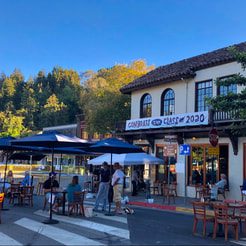The bills, both introduced earlier this year by Senator Scott Wiener, seek to provide post-pandemic extensions for restaurants’ and bars’ outdoor drinking spaces, as well as an easier path for entertainment venues to serve alcohol, all while allowing local municipalities to maintain local control.
Senate Bill 314 seeks to make what Wiener calls “common sense changes” to existing ABC regulations around extending existing liquor licenses outdoors, allowing current licensees who have emergency-relief expanded-premises permits for liquor service to have a one-year grace period in which to keep those outdoor setups — and in which to apply for permanent extensions for those licenses to the outdoors. That would mean that once local emergency declarations are lifted, post-pandemic, restaurants and bars that are currently offering outdoor seating in alleyways, parklets, and on sidewalks can continue for at least a year after that, if not longer.
“This expanded outdoor seating and service area has allowed restaurants and bars to survive and has been wildly popular with the public, with a more European street life feel,” Wiener said in a statement.
The bill also makes it simpler for bars and restaurants to bring relief to businesses that are only occupied for part of the day – think daytime cafes that close early, entertainment venues that sit empty all day until it’s showtime – allowing them to share their spaces with multiple entities (pop-ups, each other, and non-alcohol-serving businesses for instance) – lowering costs for all, with continued alcohol service from the licensee.
Wiener’s other bill, SB 793, seeks to ease California’s open-container rules when it comes to outdoor drinking at festivals or in designated “entertainment zones.” The bill authorizes cities and counties to designate such zones, and gives local governments the ability to open up shared areas or host festivals in which attendees can purchase and consume alcohol from multiple businesses and wander within the zone. ABC regulations have previously required designed “beer gardens” at festivals and no wandering around with cups outside those areas.
SB 793 also creates a new type of liquor license for entertainment venues. Currently, music venues have to apply in the same manner as bars and restaurants, and the bill will remove some of the time and administrative cost involved for these venues to be able to serve alcohol.
“These businesses are part of the fabric of our communities, and they employ so many of our neighbors,” he said in a statement.
SB 314 and 793 now head to the California State Assembly.
Mill Valley businesses have benefited greatly from a partnership between the Mill Valley Chamber and the City of Mill Valley that has focused on nimbly processing applications for use of both public and private space, including temporary parklets, street closures and converting outdoor spaces like parking lots into safe, convenient dining areas.
In February, Marin IJ columnist Dick Spotswood wrote, “easing post-prohibition era alcohol rules should continue. Drunken driving and under-21 alcohol use didn’t spike just because cafes were allowed to sell adults ‘drink at home’ bottles of wine or cocktails.”
Spotswood added that, “during the pandemic, Marinites discovered the wonders of outdoor dining. Due to our mild Mediterranean climate, enjoying meals and beverages on sidewalk tables or newly fashioned parklets became a popular option that will outlast shelter-in-place rules. Surprisingly, even when that practice led to partially closing downtown streets, only minor traffic impacts resulted. Unnecessary bureaucratic hurdles and fees that long limited outdoor dining to proprietor-owned patios ought to evaporate.”
“As we start to see the light at the end of the tunnel with this vaccine, we need to help these small businesses recover,” Wiener told the SF Chronicle.

